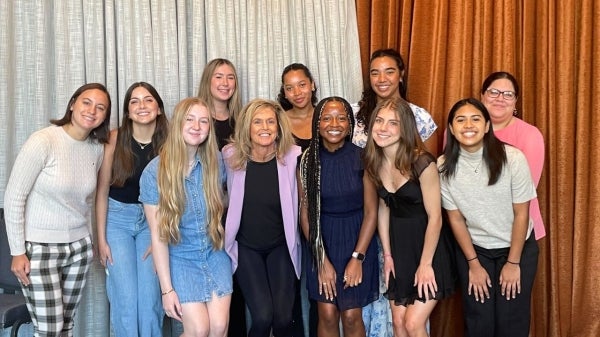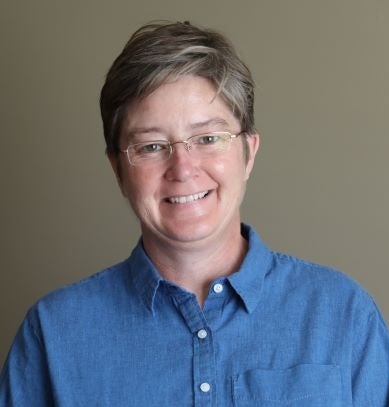Rebecca Sandefur describes civil justice this way:
“Everything that’s not criminal but is governed by law,” said Sandefur, a professor in Arizona State University’s T. Denny Sanford School of Social and Family Dynamics. “That’s employment, housing, insurance for your car. Anytime you have a relationship that has a legal aspect, so any family member, those we choose and those that are given to us by fate. Making a living, having a place to live, being able to take care of people who depend on you. Almost all those things are governed by civil law.”
The need to reform those laws and make legal aid more accessible and more affordable was the subject of a two-day conference last Thursday and Friday in the Memorial Union titled “Access to Civil Justice, Regulatory Reform And Just Solutions.”
Sandefur, a faculty fellow in the American Bar Foundation, where she leads the Access to Justice Research initiative, and an editor for Law & Society Review, organized and hosted the event, which included Supreme Court justices from two different states, human rights advocates, reform and deregulation experts and other leaders in the field of civil justice.
ASU News talked to Sandefur about the conference, the need for reforms and what those reforms could look like.
Rebecca Sandefur
Question: What was the overarching purpose of the conference?
Answer: If you look around the United States, every year, about 150 million new civil justice problems will be affecting Americans. These are things like, you have a wage-an-hour job and your employer is not paying you overtime, or you need to take care of your grandkids and enroll them in school, or you’re about to be evicted, or you’ve defaulted on your student loans. We know about 80% of the people who have these problems get no help, and one of the reasons for that is that lawyers are very expensive. So, this was a conference to think about ways to change who can deliver legal services so they can become more readily accessible and help people solve these problems.
Q: That 150 million is an exaggerated number, right?
A: It’s not exaggerated. It’s based on surveys. It’s people who are three months behind on rent and facing eviction, or you need to enroll a family member in school who is not your child and you have to deal with powers of attorney or guardianship or something like that. Those problems are prevalent all over the country.
Q: In your opening remarks at the conference, you said there is an opportunity for reform, but it will soon pass. What did you mean by that?
A: There are two pieces to that. All the stuff about the practice of law is governed at the level of states. There are a range of states across the country that are experimenting with allowing new kinds of legal practice. It won’t last forever. That’s a moment. And when the Biden administration came in, it reopened the Office for Access to Justice at the Department of Justice. And the Biden administration will not be around forever, and its capacity to do things will be reduced after the midterms. So, we have about eight months.
Q: What new legal practices are you referring to?
A: It could be computer programs helping people with different kinds of legal issues, like filling out a form. It could be social workers helping people get access to benefits or dealing with housing. It can be special kinds of licensed paralegals. There’s one state (Utah) that’s experimenting with all this.
Q: What is Utah doing?
A: There are two big rules that people are experimenting with changing. One is only lawyers can practice law. Only lawyers can give legal advice. Only lawyers can come with you to court for a hearing. Only lawyers can represent your landlord or employer. There are opportunities to relax (that rule). The other thing that people are probably less aware of is only lawyers can make money from the practice of law. So, you can’t have outside investment in an entity that delivers legal services, whether that’s helping you fill out a form or going to court with you. One of the theories is if you allow outside investments, then these organizations can invest in technology, they can scale, they can make their services cheaper. In Utah, you can relax both those (rules). Arizona has released that non-lawyer ownership issue.
Q: In terms of others practicing law, it almost sounds like you’re talking about a role equal to physician assistants.
A: Absolutely. Sort of junior varsity lawyers.
Q: Why has there been a resistance to these types of reforms?
A: There’s a consumer protection concern. Lawyers go through a lot of training, and they take a lot of tests, and they have character and fitness exams. So, can we certify people with less than that? The idea of a profession is that the profession has these values that are separate from business, and when you make it business-y by letting non-lawyers invest, maybe it will be less ethical. That’s the honest concern. The greed concern is if we certify these people and they’re cheaper than lawyers, people will use them instead.
Q: Are these reforms practiced around the world?
A: Yes. In the United Kingdom. In Africa. There are all kinds of places in the world where this already happens. We’re just a bit behind the curve. There’s something called the World Justice Project that does a justice index for the entire world, and we’re about 138th (139th, according to the latest rankings) from the top.
Q: Why is that?
A: Because justice is inaccessible due to cost and delay. It’s also that Americans are very bad at understanding they have the right to be paid for the work that they do, and sometimes law is a solution to that problem. They tend to think, “Well, my employer is a jerk, and my landlord is awful," (but don’t pursue legal options).
Q: How would these reforms work?
A: A regulatory sandbox. If we want to let people who aren’t lawyers practice law, they can apply, come into this space and then we’ll watch them. Collect data on what kind of services they provide, audit their services to make sure they’re decent quality, make sure they don’t defraud anybody. That’s one model.
The other model is to do what Arizona has done and just change the rules. Arizona got rid of that rule that says people who aren’t lawyers can’t make money from the practice of law, so they allow outside investment. You apply to become a company that has outside investment, they approve you and they let you off into the wild and go.
The other kind of reform that you see is licensed paralegals, kind of the physician assistant model you were talking about. In Utah and Arizona and Minnesota, and soon in Michigan and the state of Washington, you have people who have some legal training and are certified and licensed to do a limited legal practice. They can only do family matters, or they can only do landlord-tenant disputes, or they can only do debt claim or something like that.
Q: How have these reforms been successful in Arizona?
A: They’re about a year old, and I guess what I would say is nothing bad has happened. It takes a while to see the effects of these things.
Q: These reforms seem like common sense. Who’s against them?
A: Lawyers. I think the thing lawyers don’t understand is these people aren’t using their services now. These are folks who are not being assisted by anybody, and if you look at the state of Washington, it can become a way in which lawyers get more work because they can’t do everything. They can only do part of your problem, and sometimes your problem requires somebody to go to court or file an appeal, and then work gets funneled to an attorney. But it would never have made it to the attorney without this intermediary group because it would never have been noticed. It wouldn’t have been connected with the legal system.
Q: What do you think reforms will look like in five or 10 years?
A: I think five years from now, if we get very lucky, a big state will take them up. Let’s say, California, New York or Florida takes them up. That would be a great demonstration project about what is possible and how safe it would be.
Q: Are you optimistic or pessimistic about the chances of these reforms becoming law?
A: I’m optimistic about what they can make possible. I’m not super optimistic about how far they will go.
More Law, journalism and politics

CNN’s Wolf Blitzer to receive 41st Walter Cronkite Award for Excellence in Journalism
Wolf Blitzer, the longtime CNN journalist and anchor of “The Situation Room With Wolf Blitzer,” will accept the 41st Walter Cronkite Award for Excellence in Journalism, Arizona State University has…

Cronkite School launches Women Leaders in Sports Media live-learn program
Women in a new sports media program at Arizona State University got a solid game plan from a sports veteran at an Aug. 20 welcome event.“Be humble, be consistent and be a solver,” Charli Turner…

ASU center to host the Pursuits of Education and Excellence Symposium
The Center for the Study of Race and Democracy (CSRD) at Arizona State University is introducing the Pursuits of Education and Excellence Symposium as part of an ongoing initiative to commemorate the…

